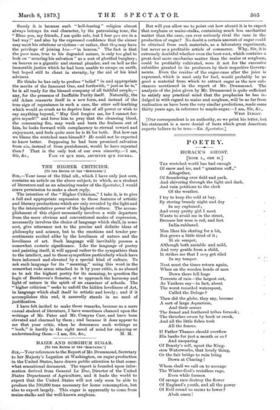THE HIGHER CRITICISM.
(TO THE EDITOR OF THE "SPECTATOR.")
SID,—Your issue of the 22nd ult., which I have only just seen, contains an article on the above subject, to which, as a student of literature and as an admiring reader of the Spectator, I would crave permission to make a short reply.
The intention of the "Higher Criticism," I take it, is to give a full and appropriate expression to those features of artistic and literary productions which are only revealed by the light and by the interpretative power of the highest culture. The accom- plishment of this object necessarily involves a wide departure from the more obvious and conventional modes of expression, necessarily involves the choice of language which shall, in some sort, give utterance not to the precise and definite ideas of philosophy and science, but to the emotions and tender pre- sentiments excited alike by the loveliness of nature and the loveliness of art. Such language will inevitably possess a -somewhat esoteric significance. Like the language of poetry and painting itself, it will appeal rather to the sympathies than to the intellect, and to those sympathies particularly which have been informed and elevated by a special kind of culture. To ask such language for its "meaning," using this word in the -somewhat rude sense attached to it by your critic, is as absurd -as to ask the highest poetry for its meaning, to question the logic of Beethoven's Sonatas, or to approach the harmony and tight of nature in the spirit of an examiner of schools. The "higher criticism" seeks to unfold the hidden loveliness of Art, in language which shall itself be artistic and lovely ; and if it accomplishes this end, it assuredly stands in no need of justification.
I have felt incited to make these remarks, because as a mere casual student of literature, I have sometimes chanced upon the writings of Mr. Pater and Mr. Comyns Carr, and have been 'elevated and charmed by them ; and because it does appear to me that your critic, when he denounces such writings as 4' bosh," is hardly in the right mood of mind for enjoying or
understanding them.—I am, Sir, &c., M. M.


































 Previous page
Previous page